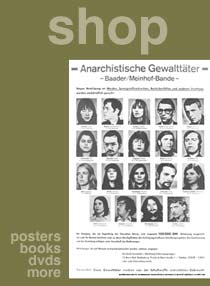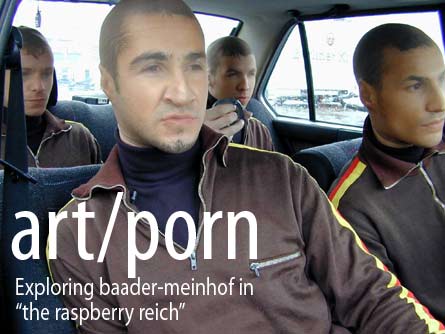 |
Interview with Director Bruce LaBruce on his new film "The Raspberry Reich"
Director Bruce LaBruce uses the Baader-Meinhof phenomenon as a jumping-off point to explore the commodification of the German radical terrorist movement in his latest film "The Raspberry Reich." After a successful circuit of many of the world's most famous film festivals, including Sundance, the Berlinale, and the Seattle International Film Festival, "This is Baader-Meinhof" creator Richard Huffman talks with LaBruce.
RICHARD HUFFMAN
Tell me a bit about yourself, your background as a filmmaker, and your filmmaking philosophy.
BRUCE LABRUCE
After growing up on a farm in Canada, I moved to Toronto to attend film school at York University. I started out in production, but transferred after two years to theory and went on to receive a Masters in film and social and political thought. While I was working on my thesis (on Hitchcock's Vertigo) I became disillusioned with academia and started hanging out in the downtown punk scene. I began to make short experimental super 8 movies with explicit homosexual content in order to disrupt the sexual complacency of the punk scene at the time. With the advent of hardcore and speedcore, a certain machismo had creeped into punk, which included a strain of homophobia and sexism. I made provocative, sexually explicit fanzines and films to challenge the sexual conformity of these supposed radicals. My first feature length movie, No Skin Off My Ass, about a gay hairdresser who falls in love with a neo-Nazi skinhead, was shot on super 8 and blown up to 16mm. It became a hit on the gay festival circuit.
My next two features, Super 8 1/2 and Hustler White, were shot on 16mm. They were also both sexually explicit art/punk movies. My latest two features, Skin Flick (hardcore version: Skin Gang) and The Raspberry Reich, were both made for porn companies. I consider myself an artist who works in porn. Up to this point with my movies I have been trying to carry on the tradition of homosexual avant-garde film-making, taking my cues from the likes of Andy Warhol, Paul Morrissey, Kenneth Anger, Jack Smith, George Kuchar, and Curt McDowell. I am also interested in following in the footsteps of other homosexual artists who made porn movies such as Peter Berlin, Jack Deveau, Wakefield Poole, Peter de Rome, and Fred Halsted. I like to make personal films, and I also consider my work "underground", although increasingly, considering the co-optive powers of corporate media and the reach of the internet, there is no such thing.
RICHARD HUFFMAN
Tell me about "The Raspberry Reich"... why did you want to make this film?
BRUCE LABRUCE
My previous movie, and first legitimate porno, Skin Flick/Skin Gang, was about a gang of neo-Nazi skinheads, representing the extreme right wing, who break into the apartment of a mixed race bourgeois gay couple and sexually terrorize and violate them. It was an investigation into why gays tend to fetishize authoritarian and fascistic figures (cops, skinheads, etc.), and the phenomenon of the prevalence of homosexuality amongst extreme right wing leaders and movements. With The Raspberry Reich I wanted to examine a gang on the extreme left wing - in this case a terrorist cell - to see if any of the sexual dynamics were similar. My last three movies, including Hustler White, which is about male prostitutes on Santa Monica Blvd. in LA, concern males who do not in any way identify themselves as gay but who nonetheless have homosexual sex with each other. I'm always interested in the idea of identity politics and the arbitrariness or artificiality of sex and gender roles. Most heterosexual men have fixed themselves in a rigid role which doesn't even allow the possibility of bi- or homo-sexual impulses, even though many theorists, from Freud on, have posited the notion that everyone is born with at least some bisexual potential. Females seem to be a little more sexually fluid. Homosexual men have likewise fixed themselves in a gay identity which doesn't allow the possibility of sex with females, sequestering themselves away in an all male environment and trying very hard not to think of the vagina. It's clear that when heterosexual men are confined together under intense circumstances - the military, prison, etc. - that homosexual behaviour emerges quite easily. Similarly, in Muslim cultures, where men and women are often segregated, homosexuality is quite common, if strictly discrete and unacknowledged. So my films often explore this disconnect between sexual potential and rigid sexual behaviour based on cultural imperatives and preconceptions.
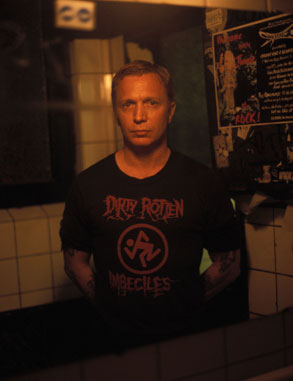 |
Raspberry Reich director Bruce LaBruce |
I became disillusioned with the gay movement very early on, even back in the mid eighties deciding that it had become politically stagnant, aesthetically bankrupt, and hopelessly bourgeois. (The current assimilationist trend toward sexual conformity, marriage, and respectability has certainly vindicated my point of view - the oppressed have demonstrably become the oppressors!) I turned to punk because it seemed to be challenging defiantly the status quo, the ascendance of corporate interests and control, and the attempts of the dominant ideology to police, dominate, and neuter all forms of dissent, otherness, and individuality. My first wake up call was realizing that even punk, this supposedly radical subculture, was sexually conformist. This led to an interest in other manifestations of social and political protest, including an investigation into the terrorist or para-military organizations of the late sixties and seventies such as the SLA, the Weathermen, the Black Panthers, and, of course, the Baader-Meinhof gang, the RAF. Each of these groups took very seriously the notion that Godard posited in his movie Numero Deux: le cul, c'est la politique: the sexual is political. They believed that revolution could only be achieved if it was accompanied by a radical rethinking of sexual mores and conventions. People forget nowadays that back then there actually was such a thing as a sexual revolution, when even members of the middle class were experimenting with promiscuity, group sex, bi- and homosexuality, communal living, sex and spirituality, etc. In university I had taken such courses as Protest Literature and Movements, and Psychoanalysis and Feminism, so I already had a background in the teachings of such thinkers as Reich, Marcuse, and other radical theorists who believed that sexual repression was responsible for much of the violence and apathy and spiritual malaise in technologically advanced cultures. I was also very interested in the way that emerging counter-cultural minorities of that era - particularly the black, gay, and feminist movements - adopted a kind of proto-military style and rhetoric, often borrowing from the kind of guerilla insurgencies that had emerged simultaneously in Central and South America. These movements were all initially Marxist-based, defiantly militant, and organized on a kind of decentralized, anarcho-syndicalist model. They emerged out of or gained momentum from the anti-Vietnam war movement and the strikes and student protests of May '68, so they were geared towards labour and empowering the common people and predicated on notions of correcting social and political injustices and inequalities based on race, class, and gender. The platforms of the ultra left wing terrorist groups which emerged from this milieu were based on these humanist, egalitarian ideals. They believed, however, that any ends justified the means to achieve these goals, which placed them in morally untenable situations, eventually rendering them almost indistinguishable from their avowed enemies. (The oppressed becoming the oppressor is a theme that runs throughout my movies.)
With The Raspberry Reich I wanted to revisit these ideas and sentiments in a more modern context. After 9/11, particularly in North America, the left was castrated and rendered virtually silent. I wanted to make a movie that gave voice once more to the left wing, anti-corporate, anti-capitalist rhetoric that was once part of the public discourse but which had become completely absent. The movie also operates as a critique of the left, skewering people who either don't practice what they preach, or who become so self-righteous and intractable in their beliefs that they themselves become oppressive and dogmatic.
The Raspberry Reich concerns an extreme left wing gang in Berlin who emulate the RAF. Gudrun is the leader of a band of impressionable, ostensibly heterosexual young men who are captivated by her radical ideas and energy. She believes, however, that heterosexual monogamy is a bourgeois construct that must be smashed in order to achieve true revolution, so she makes these straight boys have sex with each other to prove their commitment to the cause. This also just happens to be the perfect set-up for a gay porn movie.
RICHARD HUFFMAN
On your film's web site, you describe The Raspberry Reich as "an art/porn film that, like all my films, uses pornography as a starting point to examine sexual politics and homosexual radicalism. (For me, working in pornography is like a genre exercise.)" On the flip side of this, to what extent was the subject matter of "radical chic" a starting point to examine sexual politics and homosexual radicalism? Could the radical chic storyline also be viewed as a genre exercise?
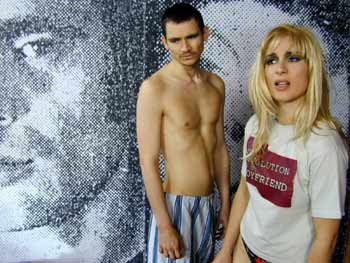 |
Revolution is my Boyfriend Daniel Bätscher is "Holger" and Susanne Sachsse is "Gudrun" in "The Raspberry Reich."
|
BRUCE LABRUCE
I also made The Raspberry Reich in order to comment on the modern cultural tendency to co-opt and commodify the signifiers of radicalism and militancy without adopting any of their actual political substance, or worse, in the process, completely contradicting their original intent. In my movie one of the slogans is 'Madonna is Counter-Revolutionary', and I do mean that literally. As I always argue, Madonna is the exact opposite of someone like Jean Genet, whose strategy was to go immediately to any place in the world where there emerged a truly revolutionary impulse (the Black Panthers in America in the late sixties; the Palestinians in the Middle East in the seventies), but as soon as he detected the first sign of co-option or institutionalization, he would not only abandon the movement but turn against it. Madonna also zeroes in on revolutionary moments (usually gay and/or black subcultural manifestations), but with the strategy of co-opting, neutralizing, commodifying, and ultimately exhausting and abandoning them. She is the ultimate example of someone who uses radical chic for exploitative and purely capitalistic ends. In Germany there has been for four or five years a resurgence in interest in the RAF, but mostly as a kind of fashionable symbol, a signifier of hip, cosmetic rebellion similar to the phenomenon of Che Guevera being turned into the new James Dean or Marilyn Monroe. There was even a movie called Baader which turned Andreas Baader into a kind of hipster folk hero, all style and no substance. Groups like the RAF did have a certain glamour quotient in the seventies, with their leather jackets, berets, sunglasses, and fast cars, but their glamour then also came from their deep convictions in social and political causes and their commitment to carrying out actions against the state. Intellectualism was also considered glamorous in those days, as opposed to the current tendency to distrust and dismiss intellectual analysis. Their glamour had to do with a kind of Robin Hood mentality. With the ascendance of capitalism, crimes against property or theft are now regarded as worse than violent crimes or murder.
The Raspberry Reich is also meant as a kind of exploitation film, a genre that has long since been co-opted by Hollywood. (What are movies like Bad Boys or American Pie if not cheap exploitation on a large budget?) There was formerly a tradition of sexploitation movies, but also b-movies that included kidnap flicks, heist movies, caper movies, etc. I'm also referencing those genres.
RICHARD HUFFMAN
Much has been made about the gender and sexual politics of the Baader-Meinhof Gang; how they represented a manifestation of the free love ideal of the sixties and seventies; how men and women shared power. But I've never seen discussed the possibility or probability that some of the members of the group are or were gay (though shear logic would say that there must have been gay members). How do you think that the group would have been viewed by the "raspberry reich" at the time, and modern followers of "radical chic" had the group been outspoken at including a gay liberation element to their espoused philosophy?
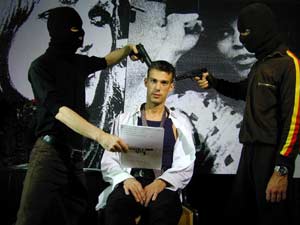 |
Radicals Holger (Daniel Bätscher), and Andreas (Dean Stathis) hold Patrick (Andreas Rupprecht) hostage.
|
BRUCE LABRUCE
Actually, in gay circles in Berlin it seems to be widely accepted that Andreas Baader started out as a male prostitute who frequented the bars in the Schoeneberg district, Berlin's gay ghetto. During the making of The Raspberry Reich, a friend introduced me to Felix Ensslin, Gudrun Ensslin's son, and we had dinner. I told him about the project, that it was an art-porno based on the sexual theories of Reich and Marcuse, and he seemed to think that the Baader/Meinhof would have been totally into the idea, and that they really did believe that the sexual was political and that sexual revolution was an important part of their agenda. When the RAF and other radical groups like the SLA and the Weathermen existed in the seventies, the tenor of the times was much different. Ideas of sexual liberation and the challenging of predominant sexual roles were much more commonly accepted and even practiced by the members of the middle class. A lot of the girls of the SLA were openly lesbian, and the Weathermen were into group sex and bisexuality. So I don't think overt homosexuality would have made them any less compelling. I mean, Huey P. Newton of the Black Panthers famously reached out to include gays and feminists as part of the kind of revolution he envisioned. It's interesting and kind of sad that the most popular black movement now, hip hop, routinely disrespects women and homosexuals. But then again, corporate hip hop is all about materialism and capitalist capitulation, as is the gay movement. Where's the Baader/Meinhof when you need them?!
RICHARD HUFFMAN
As I'm sure you're aware, Gudrun Ensslin made a porn film prior to her going underground. As I understand it, she did the film entirely in the spirit of the times; as much as a statement of sexual freedom as a way to secure money. Is there any basis of comparison for the actors in YOUR art/porn film? Did their motivations for participation go beyond the simple financial reasons?
Believe me, financial considerations were not part of their motivation. My movies are very low budget, so people aren't doing it for the money. All of the male actors in the movie are porn actors, so they were just doing their job and didn't really know what they were getting into until they got on set. They knew me by reputation and were interested in working with me. When they started to get the idea of the movie, they were quite into it. They were all smart and got what I was doing. The European attitude towards sex and porn is still very much more aligned with the spirit of sexual freedom that existed in America in the sixties and seventies. They're very adult about it, and don't seem to have a lot of the same hang-ups about porn that Americans have. I insist that everyone involved in my pornos know what they're doing and why they're doing it, and it's a completely non-exploitative environment.
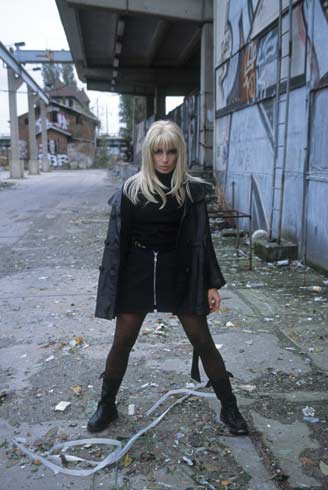 |
Leader Susanne Sachsse is "Gudrun"
|
As for Susanne Sachsse, who plays Gudrun so beautifully, she is an established Berlin stage actress who was with the Berliner Theatre Ensemble for three years and has done Brecht and all that jazz. So for her it was very much about wanting to work with me as a director and challenging herself as an actress in a very difficult role. She is from East Berlin, so having been raised behind the Iron Curtain I think she understand the ramifications of the anti-capitalist Baader-Meinhof gang much more clearly than I did, and I learned a lot from her. (For me, the whole RAF phenomenon was, from a distance, somewhat abstract; it was only after I started making the movie in Berlin and meeting people directly affected by the RAF that it became something very real and concrete.) Susanne felt as an actress that it was important for her to "go the distance" and perform in a sexually explicit scene in the movie. I had told her that I would like her to do it, but it wasn't a condition of her getting the role. It was entirely up to her. Part of the meaning of the film is to Put our Marxism where our Mouth Is and make it sexually real as a reinforcement of the ideals of sexual liberation being espoused by the movie. So Susanne was definitely in the spirit of not only the movie but the kind of radicalism that the movie is about.
RICHARD HUFFMAN
Who is your audience for the Raspberry Reich? I can imagine what it must be like for gay guys to sit through a steamy heterosexual porn film; it's pretty hard for a straight guy to watch pretty much anything that is homoerotic. Seeing the trailer for the film, I assume that this is a strong element of the film; what do you anticipate the straight guy response to the film to be? Are you hoping to be provocative and challenging to straight guys about their sexuality?
BRUCE LABRUCE
Generally in my movies I like to include something to offend everyone. I'm often surprised that there is an audience for my work at all. The art world often ignores me because they think I'm too pornographic, while the porn world resents me for being too arty or intellectual and interfering with their precious, pornographically pure product. I'm an interloper, a common adventuress. So far I've shown The Raspberry Reich in quite a few non-gay festivals - Sundance, the Berlinale, the Seattle International Film Festival, the Melbourne Underground Film Festival - and for the most part it seems to play well to straight(er) audiences. It does start out with a straight sex scene, so that may palliate some of the more nervous heterosexual male viewers. I definitely want the movie to reach straight male viewers. I've already noticed that it makes a lot of guys who review movies on the internet nervous. They go on and on at great length at how awful and terrible the movie is - it really seems to get under their skin. Perhaps I'm hitting a nerve. I hope so. Especially these supposed underground hipsters who think they're so enlightened and progressive. It's hard to get them out of the missionary position.
RICHARD HUFFMAN
By exploring the dynamics of this group of "radical chic" followers of the RAF, did you learn anything about the dynamics of the real Baader-Meinhof Gang? Meaning did any truths about how they must have operated become self-evident as you explored your fictional group?
BRUCE LABRUCE
Well, my movie is about a group of very inept, would-be terrorists who emulate the Baader-Meinhof in a kind of comical way. I was referencing movies like Fassbinder's The Third Generation, Godard's La Chinoise, and Dusav Makavejev's WR: Mysteries of the Organism - agit-prop films that playfully illustrate revolutionary principles with narrative skits, direct camera address, or even documentary elements. My movie isn't exactly supposed to be taken seriously as an investigation of the fundamental principles of terrorist abduction, but in a strange way, any time you make a movie, especially a low budget one, you become a bunch of urban guerillas. We worked completely without permits, shot in ad hoc locations without permission, shot people surreptitiously on the street without them knowing it, etc. We got kicked out of our location in a great old east berlin apartment building on Karl Marx Allee because the neighbours started to complain when they saw guys in ski masks holding guns running in and out of their building. So in a way it did approximate that kind of feeling of trying to evade the authorities and operate under the radar. Also when you make a movie you inevitably adopt this conviction that you will get it done by any means necessary, whatever it takes, that the ends justify the means completely. Shooting a porno always feels like a guerilla activity, like you're contravening some law, morally if not legally. When we were shooting on location in the suburbs of west Berlin, word somehow got out that we were making a porno and we had neighbourhood kids in the trees trying to peer in the windows. It made me realize how hard it must have been for the RAF to try to operate and do all their illegal activities without being ratted out or caught by the police. So I guess you could call us film terrorists.

